Stress Management Strategies: A Guide to Well-being
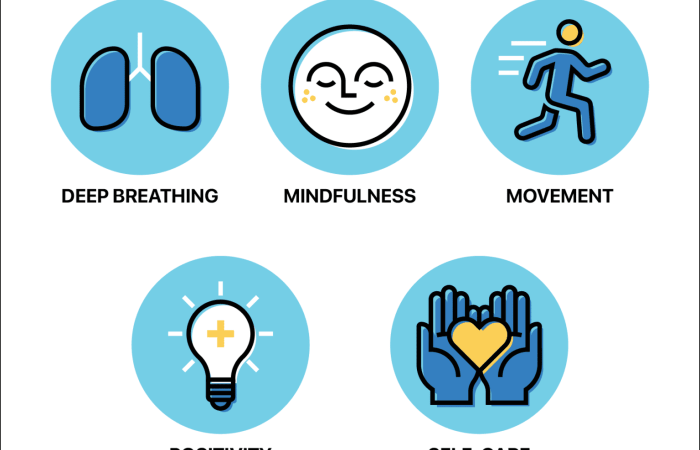
Stress Management Strategies: A Guide to Well-being is an essential toolkit for navigating the challenges of modern life. Stress, an inevitable part of our existence, can manifest in various forms, impacting our physical and mental health. This guide explores effective strategies to manage stress, fostering a sense of well-being and resilience.
From understanding the root causes of stress to implementing practical techniques, this comprehensive resource equips individuals with the knowledge and tools to thrive in a demanding world. By exploring mindfulness practices, healthy lifestyle choices, cognitive behavioral techniques, and time management strategies, we can cultivate a balanced and fulfilling life.
Understanding Stress
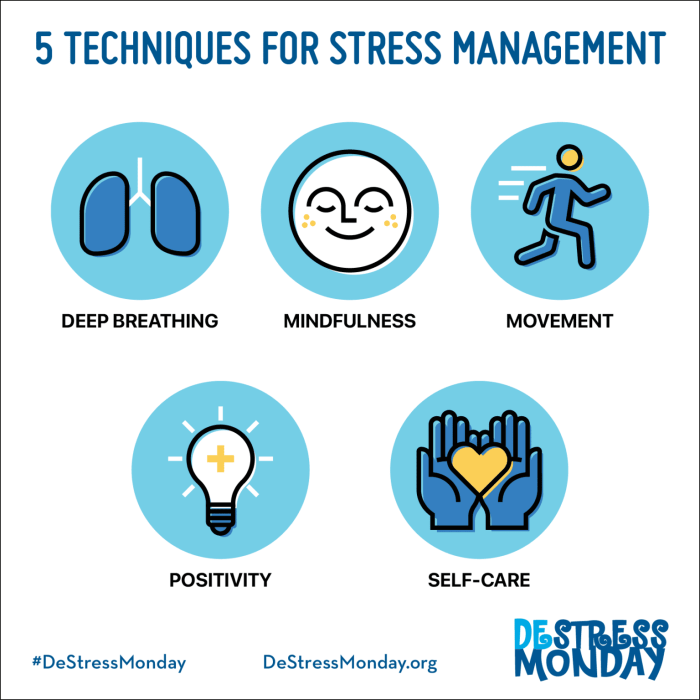
Stress is a natural response to challenging situations. It can be beneficial in small doses, motivating us to perform better. However, prolonged or excessive stress can have detrimental effects on our physical and mental well-being. Understanding the different types of stress, their impact, and our responses is crucial for managing stress effectively.
Types of Stress
Stress can be categorized into different types, each with its unique characteristics and impact.
- Eustress: This is considered positive stress, often associated with excitement and motivation. It can enhance performance and drive us to achieve goals. For example, the anticipation of a job interview or the thrill of a competition can be considered eustress.
- Distress: This is negative stress that can have a harmful impact on our health. It arises from overwhelming situations, deadlines, or difficult relationships. Examples include financial worries, relationship conflicts, or job insecurity.
- Acute Stress: This type of stress is short-term and intense, usually triggered by specific events. It can be beneficial in emergencies, providing a burst of energy to respond to threats. For example, a sudden loud noise or a car accident can induce acute stress.
- Chronic Stress: This is long-term stress that persists over an extended period. It can be caused by ongoing challenges, demanding jobs, or chronic illnesses. Chronic stress can have severe consequences for both physical and mental health.
Common Stressors in Daily Life
Stressors are external factors that trigger stress responses. They can be personal, professional, or environmental.
- Work-related stressors: Job insecurity, demanding deadlines, heavy workload, and conflict with colleagues are common stressors in the workplace.
- Financial stressors: Debt, financial instability, and unexpected expenses can significantly contribute to stress levels.
- Relationship stressors: Conflicts with partners, family members, or friends can cause emotional distress.
- Health stressors: Chronic illnesses, injuries, and health concerns can be major sources of stress.
- Environmental stressors: Noise pollution, traffic congestion, and overcrowding can contribute to stress levels.
Physiological and Psychological Responses to Stress
When we encounter a stressor, our body initiates a complex physiological response known as the “fight-or-flight” response. This response is designed to prepare us to deal with threats.
- Physiological Responses:
- Increased heart rate and blood pressure: The body directs more blood to the muscles, preparing for action.
- Release of stress hormones: Adrenaline and cortisol are released, increasing alertness and energy.
- Rapid breathing: The body takes in more oxygen to fuel the fight-or-flight response.
- Muscle tension: Muscles tense up, preparing for physical action.
- Digestive system slowdown: Blood is diverted away from the digestive system to prioritize other functions.
- Psychological Responses:
- Anxiety and worry: The mind becomes preoccupied with the stressor, leading to feelings of unease.
- Irritability and anger: Stress can make us more easily frustrated and prone to outbursts.
- Difficulty concentrating: Stress can impair focus and make it challenging to concentrate on tasks.
- Sleep disturbances: Stress can disrupt sleep patterns, leading to insomnia or nightmares.
Identifying Stress Triggers
Understanding your personal stress triggers is crucial for managing stress effectively. By identifying the specific situations, thoughts, or events that trigger your stress response, you can develop strategies to avoid, minimize, or cope with them.
Keeping a Stress Journal
Keeping a stress journal or log can be a valuable tool for identifying your personal stress triggers. It involves regularly recording your stressful experiences, including the time, place, and circumstances surrounding them.
- Note the specific thoughts, feelings, and physical sensations you experience during stressful situations.
- Record any external factors or events that might have contributed to your stress.
- Reflect on any patterns or commonalities you notice in your stress triggers.
This detailed record can help you identify recurring triggers and develop strategies to manage them more effectively.
Mindfulness and Relaxation Techniques
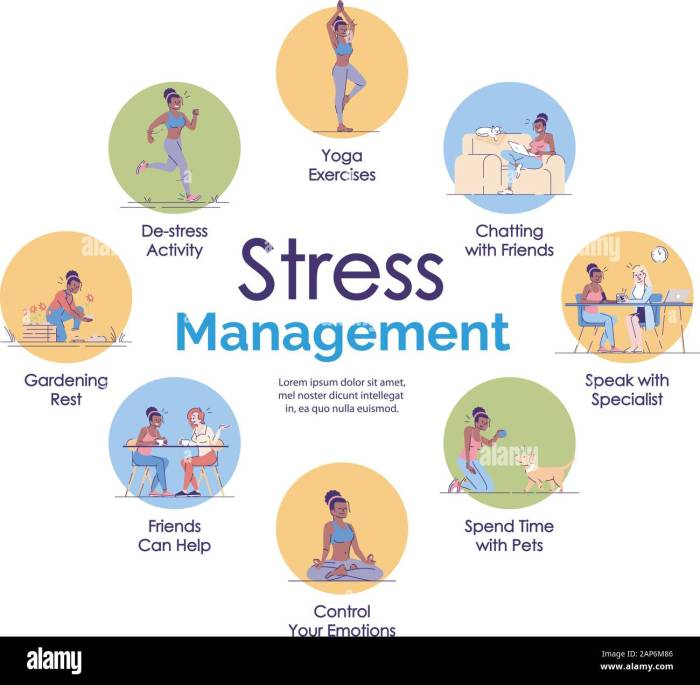
Mindfulness and relaxation techniques are powerful tools for managing stress. By cultivating awareness of the present moment and engaging in practices that promote relaxation, you can reduce the negative effects of stress on your physical and mental well-being.
Mindfulness Practices
Mindfulness involves paying attention to the present moment without judgment. It encourages observing your thoughts, feelings, and sensations without getting caught up in them.
- Increased Self-Awareness: Mindfulness helps you become more aware of your thoughts, feelings, and bodily sensations, allowing you to identify stress triggers and manage them more effectively.
- Reduced Stress and Anxiety: Studies have shown that mindfulness practices can reduce stress hormones like cortisol, leading to a decrease in feelings of anxiety and worry.
- Improved Emotional Regulation: By cultivating awareness of your emotions, mindfulness allows you to observe and accept them without judgment, fostering greater emotional regulation and resilience.
- Enhanced Focus and Concentration: Mindfulness practices can improve your ability to focus and concentrate, leading to better performance in various aspects of life.
- Increased Compassion and Empathy: Mindfulness promotes self-compassion and empathy, allowing you to understand and relate to yourself and others with greater kindness and understanding.
Simple Mindfulness Exercises
Here are some simple mindfulness exercises you can incorporate into your daily routine:
Deep Breathing
Deep breathing is a fundamental mindfulness practice that helps calm the nervous system and reduce stress.
- Find a Comfortable Position: Sit or lie down in a comfortable position, ensuring your spine is straight but relaxed.
- Focus on Your Breath: Close your eyes and gently focus your attention on your breath. Notice the rise and fall of your chest or abdomen as you inhale and exhale.
- Deep Inhalations: Inhale slowly and deeply through your nose, allowing your abdomen to expand. Feel the air filling your lungs.
- Exhale Slowly: Exhale slowly and gently through your mouth, releasing any tension you may be holding.
- Repeat: Continue this deep breathing pattern for several minutes, focusing on the sensation of your breath.
Mindful Meditation
Mindful meditation involves focusing your attention on a single point, such as your breath, a mantra, or a specific object.
- Find a Quiet Space: Find a quiet and comfortable space where you can sit or lie down without distractions.
- Choose a Focus: Select a focus for your meditation, such as your breath, a mantra, or a specific object.
- Begin Meditation: Close your eyes and gently focus your attention on your chosen focus. Notice the sensations of your breath, the sound of your mantra, or the details of the object.
- Observe Thoughts: As thoughts arise, acknowledge them without judgment and gently guide your attention back to your focus.
- Practice Regularly: Aim to meditate for a few minutes each day, gradually increasing the duration as you become more comfortable.
Progressive Muscle Relaxation
Progressive muscle relaxation is a technique that involves systematically tensing and relaxing different muscle groups in your body. This process helps you become aware of muscle tension and promotes relaxation throughout your body.
- Reduces Muscle Tension: Progressive muscle relaxation helps release tension in your muscles, which can be a major contributor to stress and anxiety.
- Promotes Relaxation: By focusing on the difference between tension and relaxation, this technique trains your body to relax more easily.
- Improves Sleep Quality: Reducing muscle tension can improve sleep quality, as muscle tension can interfere with restful sleep.
- Reduces Stress-Related Symptoms: Progressive muscle relaxation can help alleviate stress-related symptoms such as headaches, muscle aches, and fatigue.
Healthy Lifestyle Choices
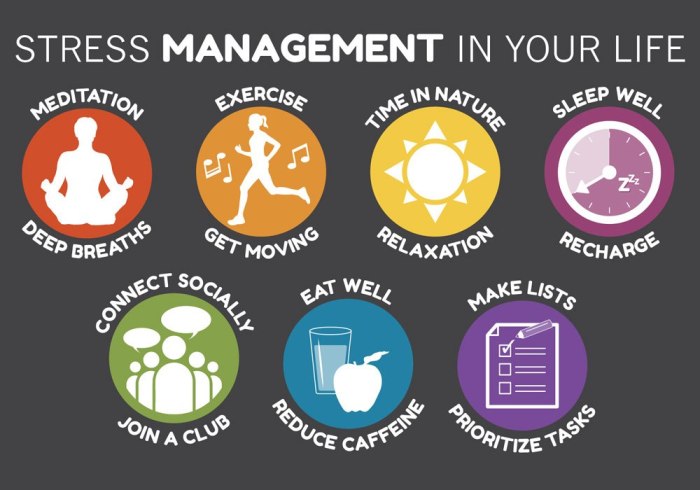
A healthy lifestyle plays a crucial role in managing stress effectively. By incorporating positive habits into your daily routine, you can enhance your body’s resilience and improve your ability to cope with stress.
Regular Physical Activity
Regular physical activity is a powerful stress reliever. Exercise releases endorphins, which have mood-boosting effects and help reduce feelings of anxiety and depression. Engaging in physical activity can also help improve sleep quality, boost energy levels, and enhance overall well-being.
- Cardiovascular exercise: Activities like running, swimming, cycling, or brisk walking elevate your heart rate and improve blood flow, reducing stress hormones like cortisol.
- Strength training: Resistance exercises like weightlifting or bodyweight training can help build muscle mass, improve bone density, and release stress-reducing endorphins.
- Yoga and Pilates: These practices combine physical postures with deep breathing techniques, promoting relaxation and reducing stress.
Diet and Stress
The food you consume can significantly impact your stress levels. A balanced diet rich in fruits, vegetables, whole grains, and lean protein provides essential nutrients that support your body’s ability to cope with stress. Conversely, a diet high in processed foods, sugary drinks, and saturated fats can contribute to stress and inflammation.
- Fruits and vegetables: These are packed with vitamins, minerals, and antioxidants that help regulate mood and reduce stress.
- Whole grains: Provide complex carbohydrates that release energy slowly, promoting stable blood sugar levels and reducing stress-related fatigue.
- Lean protein: Essential for building and repairing tissues, protein can help regulate blood sugar and provide sustained energy levels.
- Omega-3 fatty acids: Found in fatty fish, nuts, and seeds, omega-3s have anti-inflammatory properties that can reduce stress and improve mood.
Getting Enough Sleep
Sleep is crucial for stress management. When you’re well-rested, your body can better cope with stress. Sleep deprivation, on the other hand, can increase cortisol levels, making you more susceptible to stress.
- Establish a regular sleep schedule: Going to bed and waking up around the same time each day, even on weekends, helps regulate your body’s natural sleep-wake cycle.
- Create a relaxing bedtime routine: Engage in calming activities like taking a warm bath, reading a book, or listening to soothing music before bed.
- Optimize your sleep environment: Ensure your bedroom is dark, quiet, and cool, and use blackout curtains or an eye mask to block out light.
Cognitive Behavioral Techniques
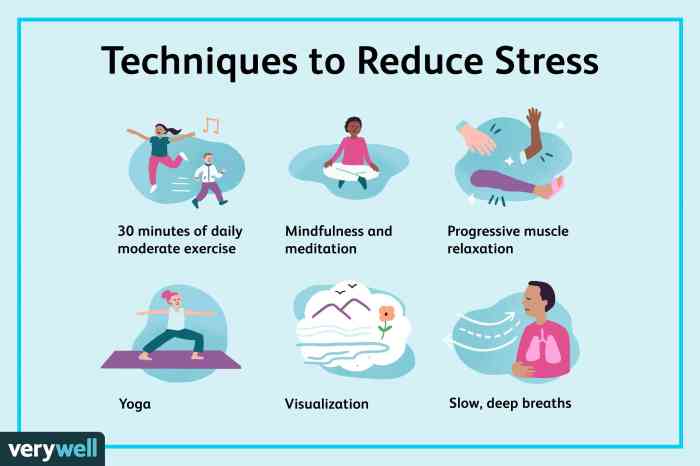
Cognitive behavioral therapy (CBT) is a type of psychotherapy that focuses on changing negative thought patterns and behaviors that contribute to stress. It helps individuals identify and challenge their unhelpful thoughts and develop more adaptive coping mechanisms.
Cognitive Restructuring
Cognitive restructuring is a core principle of CBT that involves identifying and challenging negative thoughts, beliefs, and assumptions that contribute to stress. By recognizing and changing these distorted thought patterns, individuals can reduce their stress levels and improve their overall well-being.
- Identifying Negative Thoughts: The first step in cognitive restructuring is to become aware of your negative thoughts. This can be done by keeping a thought journal, where you record your negative thoughts and the situations that trigger them. It is important to be specific and detailed when describing these thoughts.
- Challenging Negative Thoughts: Once you have identified your negative thoughts, the next step is to challenge them. This involves asking yourself questions about the validity and accuracy of these thoughts. For example, you can ask yourself:
- Is this thought based on facts or assumptions?
- Is there another way to interpret the situation?
- What evidence supports this thought?
- What evidence contradicts this thought?
- Replacing Negative Thoughts with More Positive Ones: After challenging your negative thoughts, the next step is to replace them with more positive and realistic ones. This involves focusing on the positive aspects of the situation and developing a more balanced perspective. For example, if you are feeling overwhelmed with work, you can remind yourself of your accomplishments and the skills you possess.
Assertiveness Training
Assertiveness training is a technique that teaches individuals how to communicate their needs and boundaries in a clear, direct, and respectful manner. It helps individuals to reduce stress by minimizing conflicts and asserting their rights without being aggressive or passive.
- Understanding Assertive Communication: Assertive communication involves expressing your needs and opinions clearly and respectfully, while also respecting the needs and opinions of others. It is about finding a balance between being too passive and too aggressive.
- Developing Assertive Communication Skills: Assertiveness training helps individuals develop the skills necessary for effective assertive communication. This includes learning how to:
- Use “I” statements to express your feelings and needs.
- Make direct requests.
- Set boundaries and limits.
- Say “no” respectfully.
- Handle criticism and feedback constructively.
- Benefits of Assertiveness Training: Assertiveness training can reduce stress by:
- Improving communication skills.
- Reducing conflicts.
- Boosting self-esteem.
- Promoting a sense of control.
Time Management and Prioritization: Stress Management Strategies
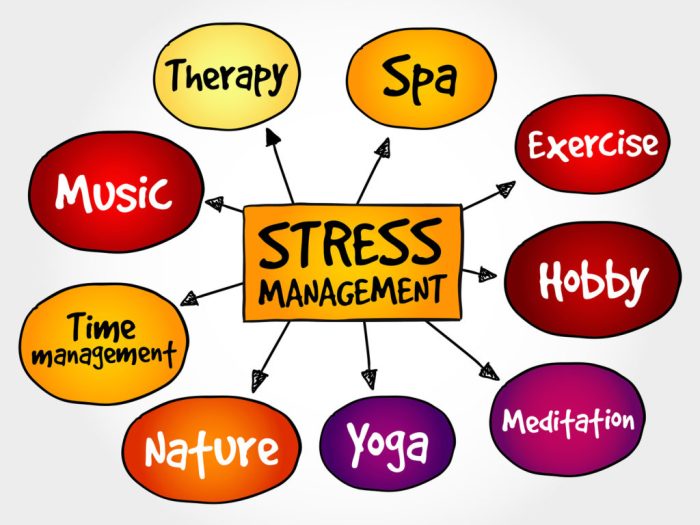
Effective time management is a crucial skill for stress reduction. When you manage your time well, you feel more in control of your life and less overwhelmed by daily demands. This can significantly reduce feelings of stress and anxiety.
Setting Realistic Goals and Prioritizing Tasks
Setting realistic goals and prioritizing tasks are essential for effective time management. Start by identifying your goals and breaking them down into smaller, manageable tasks. Prioritize these tasks based on their urgency and importance. Focus on completing high-priority tasks first, and then move on to lower-priority ones.
“The key is not to prioritize what’s on your schedule, but to schedule your priorities.”
Stephen Covey
Delegating Tasks and Avoiding Overcommitting
Delegating tasks to others can be a valuable time management strategy. It allows you to focus on your most important responsibilities and avoid feeling overwhelmed. It is also important to learn to say “no” to requests that will add to your already full schedule.
Overcommitting can lead to stress and burnout.
Social Support and Connections
Strong social connections are a powerful tool for stress management. Having a supportive network of family, friends, and community members can provide a buffer against the negative effects of stress.
Benefits of Social Support
Social support offers numerous benefits for managing stress, including:
- Reduced stress levels: Social interaction releases oxytocin, a hormone that promotes feelings of well-being and reduces stress hormones like cortisol.
- Improved emotional regulation: Sharing feelings and concerns with trusted individuals can help individuals regulate their emotions more effectively, leading to better-coping mechanisms.
- Increased resilience: Social support provides a sense of belonging and purpose, boosting resilience and helping individuals navigate challenging situations more effectively.
- Enhanced physical health: Studies show that individuals with strong social connections have lower blood pressure, improved immune function, and a reduced risk of chronic diseases.
Seeking Support
It is crucial to actively seek support from those around you.
- Family and friends: Reach out to family members and close friends to share your concerns and seek their advice or simply their presence.
- Support groups: Joining support groups for individuals facing similar challenges can provide a sense of community and shared understanding.
- Professional help: Therapists and counselors can offer guidance and tools for managing stress and building healthier relationships.
Building Healthy Relationships
Nurturing healthy relationships is essential for maintaining social support.
- Open communication: Expressing your needs and feelings openly and honestly is crucial for building trust and understanding.
- Active listening: Pay attention to the thoughts and feelings of others, showing genuine interest and empathy.
- Quality time: Prioritize spending quality time with loved ones, engaging in meaningful conversations and shared activities.
- Reciprocity: Give and receive support in a balanced way, ensuring that relationships are mutually beneficial.
Seeking Professional Help
Stress is a normal part of life, but for some individuals, it can become overwhelming and debilitating. If you’ve tried various stress management techniques and haven’t seen improvement, or if your stress is significantly impacting your daily life, seeking professional help is crucial.
Mental Health Professionals, Stress management strategies
It’s important to understand that seeking professional help for stress management doesn’t necessarily mean you have a mental health condition. Mental health professionals can provide valuable support and guidance to help you develop coping mechanisms and manage your stress effectively.
- Psychologists: These professionals have a doctorate in psychology and are trained to assess, diagnose, and treat mental health conditions. They use various therapeutic approaches, including cognitive behavioral therapy (CBT), to help individuals manage stress, anxiety, and depression.
- Psychiatrists: Psychiatrists are medical doctors specializing in mental health. They can diagnose and treat mental health conditions, including stress disorders. They can also prescribe medication if needed.
- Therapists: This term encompasses a wide range of professionals, including licensed clinical social workers (LCSWs), marriage and family therapists (MFTs), and licensed professional counselors (LPCs). They are trained to provide therapy and counseling services to individuals, couples, and families.
- Support Groups: These groups offer a safe and supportive environment for individuals to connect with others who share similar experiences. Support groups can provide emotional support, coping strategies, and a sense of community.
Final Thoughts
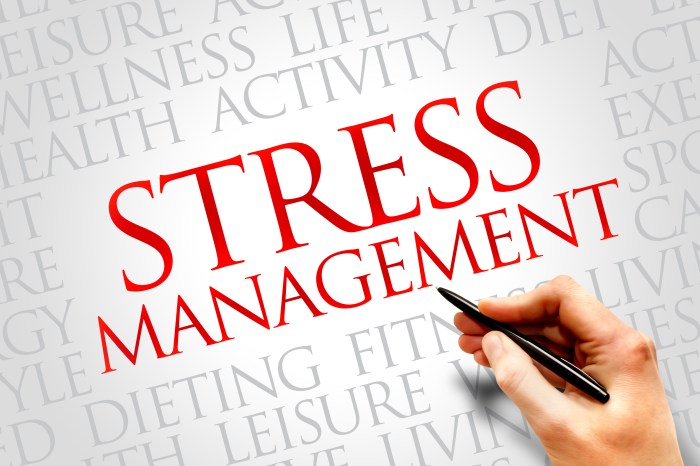
In conclusion, stress management is a continuous journey, requiring ongoing self-awareness, proactive strategies, and a commitment to well-being. By embracing the techniques Artikel in this guide, we can navigate the complexities of life with greater resilience and find a sense of peace amidst the challenges we face.
Remember, taking care of our mental and emotional health is not a luxury, but a necessity for a fulfilling and vibrant life.
Comments are closed.